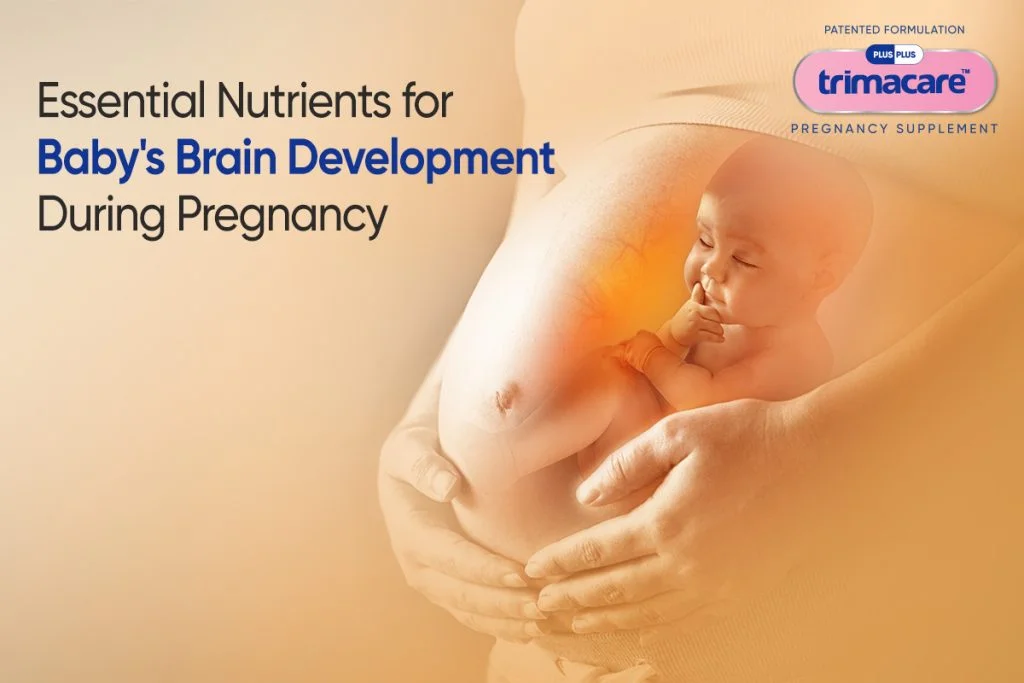Did you know that the nutrients you consume during pregnancy play a significant role in the development of your baby’s brain? From omega-3 fatty acids to folic acid and a host of other vital nutrients, nourishing your baby’s growing mind is of utmost importance. Proper nutrition plays a crucial role in the development of the foetal brain. The lifestyle, diet, mental health, and prenatal care of the mother impacts the baby’s brain development during pregnancy. In this blog post, we will explore the crucial nutrients that contribute to the brain development of your baby during pregnancy.
Essential Nutrients for Baby’s Brain Development During Pregnancy
Nutrition plays a vital role in supporting optimal brain development, ensuring a strong foundation for your baby’s cognitive growth. Here are some key nutrients that are important for optimal brain development during pregnancy:
- Omega-3 Fatty Acids: Omega-3 fatty acids, particularly docosahexaenoic acid (DHA), are essential for the development of the foetal brain and eyes. DHA helps in the growth and functioning of brain cells and is important during the third trimester when the brain undergoes rapid development. Fatty fish (such as salmon and sardines), walnuts, flaxseeds, and chia seeds are excellent dietary sources of omega-3 fatty acids.
- Folic Acid: Folic acid is crucial for proper neural tube development and the formation of the brain and spinal cord. Adequate folic acid intake before and during early pregnancy can significantly reduce the risk of neural tube defects. Folic acid-rich foods include leafy green vegetables, fortified cereals, legumes, and citrus fruits.
- Iodine: Iodine is essential to produce thyroid hormones, which are crucial for brain development in pregnancy. Insufficient iodine intake during pregnancy can lead to cognitive impairments in the child. Some key sources of iodine during pregnancy are iodized salt, seafood, dairy products, and eggs.
- Iron: Iron is necessary for the transport of oxygen to the developing brain. Inadequate iron levels during pregnancy can impair cognitive development and increase the risk of developmental delays. Lean meats, poultry, fish, lentils, and fortified cereals are important food sources of iron.
- Choline: Choline is important for brain development in pregnancy and helps in the formation of neural connections. Chlorine is found in foods such as eggs, lean meats, fish, dairy products, and cruciferous vegetables like broccoli.
- Vitamin D: Vitamin D plays a vital role in brain development in pregnancy and functioning. Adequate vitamin D levels during pregnancy are associated with better cognitive outcomes in children. Natural sources of vitamin D are sunlight exposure (in moderation), fatty fish, fortified dairy products, and fortified cereals.
- Zinc: Zinc helps in a various brain development in pregnancy and function processes. It supports neuronal growth, synapse formation, and neurotransmitter function. Zinc-rich foods include lean meats, poultry, shellfish, legumes, nuts, and whole grains.
Ensuring optimal brain development for your baby during pregnancy involves providing essential nutrients such as omega-3 fatty acids, folic acid, iodine, iron, choline, vitamin D, and zinc. A well-balanced diet, along with regular prenatal care and a healthy lifestyle, sets the stage for your baby’s cognitive potential.
When it comes to supporting optimal baby brain development during pregnancy, Trimacare Prenatal Multivitamins emerge as the best bet. This carefully designed supplement contains all the essential nutrients crucial for the growing mind of the baby. From vital omega-3 fatty acids, including DHA, to folic acid, iodine, iron, choline, vitamin D, and zinc, Trimacare ensures that expecting mothers receive a comprehensive blend of nutrients to foster their baby’s cognitive potential. With its trimester-specific care, Trimacare Pregnancy Multivitamins cater to the increasing needs of both the mother and the baby during each stage of pregnancy. By incorporating Trimacare into their daily routine, expectant mothers can rest assured that they are providing their developing baby with the necessary building blocks for a strong foundation in brain development. Trimacare Prenatal Multivitamins stand as a reliable and effective choice to promote the healthy brain development of babies during this critical phase of pregnancy.
Frequently Asked Questions:
1. What are some essential nutrients for baby’s brain development during pregnancy?
During pregnancy, omega-3 fatty acids, choline, iron, iodine, and folate are all important nutrients for the brain development of the baby.
2. How does omega-3 fatty acids contribute to baby’s brain development during pregnancy?
Omega-3 fatty acids, particularly DHA (docosahexaenoic acid), support the development of the nervous system and cognitive functions in foetuses.
3. Why is choline important for baby’s brain development during pregnancy?
Because it aids in the production of neurotransmitters necessary for cognitive function and helps in the formation of neural tube structures, choline is essential for the development of the fetal brain.
4. What role does iron play in baby’s brain development during pregnancy?
Iron is required for oxygen transport to the baby’s developing brain cells, which aids in cognitive development and keeps neural tube defects at bay.
5. How does folate contribute to baby’s brain development during pregnancy?
Folate is necessary for the rapid growth and development of the fetal brain, the prevention of neural tube defects, and the support of cognitive function. Folate is also necessary for cell division and the synthesis of DNA.
A Certified Nutritionist with a rich healthcare background in health journalism, the author has immense experience in curating reader-friendly, engaging, and informative healthcare blogs to empower readers to make informed pregnancy-related decisions.













